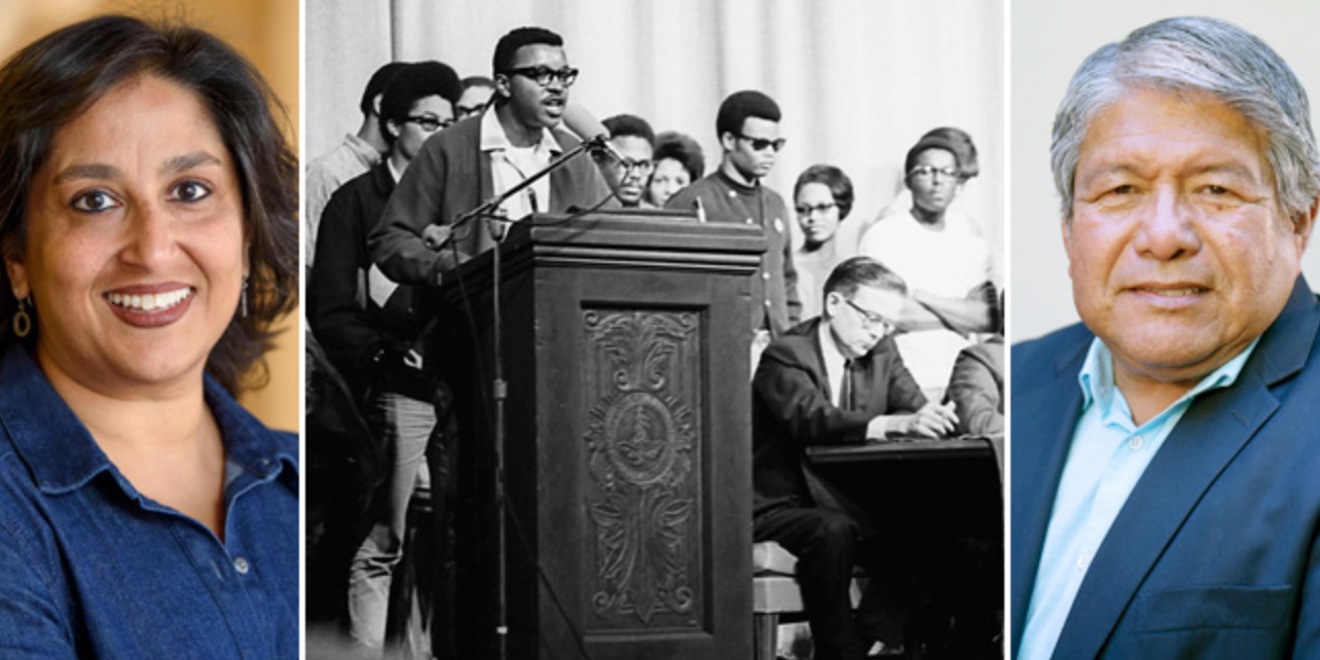Last Friday, students, alumni, faculty and administrators converged for the 24th annual Multicultural Hall of Fame Induction, which celebrates the contributions of some of the University’s most accomplished alumni of color in promoting greater ethnic awareness and furthering the cause of racial equality on local, regional and national stages.
Established in 1995, the Multicultural Hall of Fame accepts alumni selected by the University’s Asian American Activities Center, Black Community Services Center, El Centro Chicano y Latino and Native American Cultural Center. This year’s event, held during Stanford’s 2018 Reunion Homecoming, honored Isidro D. Ortiz M.A. ’73, Ph.D. ‘73, Colin Cloud Hampson ’91 M.A. ’91 J.D. ’94, Srinija Srinivasan ’93 and the members of the 1968 Black Student Union (BSU).
Dr. Frank “Omowale” Satterwhite Ph.D. ’77 and Dr. Joyce King ’69, Ph.D. ’74 represented the BSU, accepting the award for Take Back the Mic in 1968. This year marks the 50th anniversary of the landmark event, in which a group of 70 black students forcefully took the microphone from then provost Richard Lyman during an assembly held four days after Dr. Martin Luther King Jr.’s assassination. Both Satterwhite and King were among those students.
Satterwhite, who was given the microphone by one of his peers, read a list of 10 demands to the University, heralding a wave of transformative institutional changes forming the bedrock of Stanford’s long-standing diversity initiatives. Today, Take Back the Mic stands as a critical joint effort on behalf of racial justice.
“What happened was not the result of a single person’s ideas or actions,” Satterwhite said. “We all came together. We worked together. We organized ourselves.”
King echoed this sentiment, placing Take Back the Mic in a larger, multi-generational context.
“This is a collective, ongoing process,” she said. “We need to ask in what ways does the University need to be challenged to continue to support socially and racially just education today.”
Hampson, whose commitment to Native American rights has defined his law career, recalled those who had inspired his own trajectory towards political advocacy while forecasting a long road ahead.
“I stand on the shoulder of giants,” he said, “yet make no mistake. There is still much to be done.”
Ortiz, Stanford’s first Chicano Ph.D. recipient in political science, said he believes the University could continue to play a crucial role in cultivating an equitable society. He voiced hopes that Stanford could provide current students with the tools and mentorship to forge long-lasting policies and practices to dismantle systematic racism, just as the University provided for him.
“Things that are don’t necessarily have to be [that] way,” Ortiz said.
“I do believe if progress is to come, this tumultuous reckoning is prerequisite,” added Srinivasan, referring to today’s turbulent political climate.
As a former member of the U.S. Partnership on Mobility from Poverty and Commission on Presidential Scholars, Srinivasan has worked to honor outstanding graduating U.S. high school students and promote economic stability with help from other philanthropists, activists and scholars. Until 2010, she was also the vice president and editor-in-chief of Yahoo! Inc.
Srinivasan encouraged Stanford to not only double down on its pledge to universal dignity and equity but also to defy the intolerance and bigotry she believes are hostile to the American promise of a free nation.
“As people of color, we have all navigated [our] paths being both of and outside the default dominant culture,” she said. “How can we de-center the dominant culture and re-center a new culture that invites, includes and celebrates?”
In a demonstration of solidarity, the inductees reveled in their achievements while grounding themselves in reverence for activists, parents, friends and mentors who have afforded them the opportunity to speak out against racial injustice.
In considering the vast support structures that have buoyed students of color thus far, Dr. Joyce King said, “I think all of us need to think because of them we all can.”
Contact Ricardo Lopez at rclopez ‘at’ stanford.edu.
